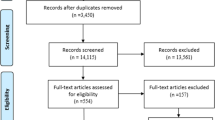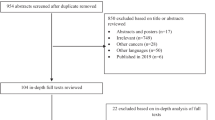Abstract
Purpose
This study provides an updated evaluation of the prevalence and severity of acute cancer-related symptoms and quality of life (QOL) concerns among patients treated with emetogenic chemotherapy.
Methods
Patients were recruited to a larger, multi-site observational study prior to starting chemotherapy. Participants completed sociodemographic questionnaires and clinical data were abstracted via medical record review. Symptoms and QOL were assessed 5 days after starting moderately or highly emetogenic chemotherapy. Functional Assessment of Cancer Therapy – General assessed QOL concerns. Patient Reported Outcomes version of the Common Terminology Criteria for Adverse Events evaluated symptoms. Symptoms were considered severe when participants responded “severe” or “very severe.”
Results
Participants (N = 1174) were on average 58 ± 13 years, mostly female (73%), non-Hispanic (89%), and White (87%). Most participants were diagnosed with breast (38.1%), gynecological (20%), and gastrointestinal (17.1%) cancer. The most common QOL concerns of any severity were fatigue (94%), anhedonia (89%), dissatisfaction with QOL (86%), and sleep disturbance (86%). The most common severe QOL concerns were anhedonia (44%), fatigue (40%), and inability to work (38%). Decreased appetite (74%), pain (71%), and constipation (70%) were the most common symptoms of any severity, as well as most common severe symptoms (13%, 18%, and 18%, respectively).
Conclusion
Herein, updates are provided in regard to QOL concerns and symptoms reported by patients in the days after chemotherapy and demonstrates that concerns and symptoms have shifted in the last decade.

Similar content being viewed by others
Data availability
The data that support the findings of this study are available from the corresponding author upon reasonable request.
References.
Haiderali A, Menditto L, Good M et al (2011) Impact on daily functioning and indirect/direct costs associated with chemotherapy-induced nausea and vomiting (CINV) in a U.S. population. Support Care Cancer 19(6):843–51
Jacobs JM, Ream ME, Pensak N et al (2019) Patient experiences with oral chemotherapy: adherence, symptoms, and quality of life. J Natl Compr Canc Netw 17(3):221–228
Jordan K, Aapro M, Kaasa S et al (2018) European Society for Medical Oncology (ESMO) position paper on supportive and palliative care. Ann Oncol 29(1):36–43
Von Ah D, Brown CG, Brown SJ, Bryant AL, Davies M, Dodd M, Ferrell B, Hammer M, Knobf MT, Knoop TJ, LoBiondo-Wood G, Mayer DK, Miaskowski C, Mitchell SA, Song L, Watkins Bruner D, Wesmiller S, Cooley ME (2019) Research agenda of the oncology nursing society: 2019-2022. Oncol Nurs Forum 46(6):654–669. https://doi.org/10.1188/19.ONF.654-669
Knobf M, Cooley ME, Duffy S, et al. The 2014–2018 Oncology Nursing Society research agenda. In: Oncology nursing forum, 2015: Abstract 42, p. 450–465
Olver IN, Chin M, Lalla RV (2021) Now we are 30: 10 more years of MASCC. Support Care Cancer 29(4):1713–1718
Coates A, Abraham S, Kaye SB et al (1983) On the receiving end—patient perception of the side-effects of cancer chemotherapy. Eur J Cancer Clin Oncol 19(2):203–208
Griffin AM, Butow PN, Coates AS et al (1996) On the receiving end. V: Patient perceptions of the side effects of cancer chemotherapy in 1993. Ann Oncol 7(2):189–95
Temel JS, Greer JA, El-Jawahri A et al (2016) Effects of early integrated palliative care in patients with lung and GI cancer: a randomized clinical trial. J Clin Oncol 35(8):834–841
Bender CM, McDaniel RW, Murphy-Ende K et al (2002) Chemotherapy-induced nausea and vomiting. Clin J Oncol Nurs 6(2):94–102
Ness S, Kokal J, Fee-Schroeder K, Novotny P, Satele D, Barton D (2013) Concerns across the survivorship trajectory: results from a survey of cancer survivors. Oncol Nurs Forum 40(1):35–42. https://doi.org/10.1188/13.ONF.35-42
Wagland R, Richardson A, Armes J et al (2015) Treatment-related problems experienced by cancer patients undergoing chemotherapy: a scoping review. Eur J Cancer Care 24(5):605–617
Ezendam NPM, Pijlman B, Bhugwandass C et al (2014) Chemotherapy-induced peripheral neuropathy and its impact on health-related quality of life among ovarian cancer survivors: results from the population-based PROFILES registry. Gynecol Oncol 135(3):510–517
Şahin ZA, Tan M (2016) Quality of life and symptom experience of breast cancer patients undergoing chemotherapy. Holist Nurs Pract 30(4):193–200
Smith EML, Pang H, Cirrincione C et al (2013) Effect of duloxetine on pain, function, and quality of life among patients with chemotherapy-induced painful peripheral neuropathy: a randomized clinical trial. JAMA 309(13):1359–1367
Galiano-Castillo N, Ariza-García A, Cantarero-Villanueva I et al (2014) Depressed mood in breast cancer survivors: associations with physical activity, cancer-related fatigue, quality of life, and fitness level. Eur J Oncol Nurs 18(2):206–210
Carr AC, Vissers MC, Cook JS (2014) The effect of intravenous vitamin C on cancer- and chemotherapy-related fatigue and quality of life. Front Oncol 4:283. https://doi.org/10.3389/fonc.2014.00283
Patel VR, Hussaini SMQ, Blaes AH et al (2023) Trends in the prevalence of functional limitations among US cancer survivors, 1999–2018. JAMA Oncol 9(7):1001–1003
Olver IN (2005) Update on anti-emetics for chemotherapy-induced emesis. Intern Med J 35(8):478–481
Dans M, Kutner JS, Agarwal R et al (2021) NCCN Guidelines® insights: palliative care, version 2.2021. J Natl Compr Canc Netw 19(7):780–788
Council NR (2006) Medicine Io. From cancer patient to cancer survivor: lost in transition: An American Society of Clinical Oncology and Institute of Medicine Symposium: National Academies Press
Cella DF, Tulsky DS, Gray G et al (1993) The Functional Assessment of Cancer Therapy scale: development and validation of the general measure. J Clin Oncol 11(3):570–579
Brucker PS, Yost K, Cashy J et al (2005) General population and cancer patient norms for the Functional Assessment of Cancer Therapy-General (FACT-G). Eval Health Prof 28(2):192–211
Mah K, Swami N, Le LW et al (2020) Validation of the 7-item Functional Assessment of Cancer Therapy-General (FACT-G7) as a short measure of quality of life in patients with advanced cancer. Cancer 126(16):3750–3757
Yost KJ, Thompson CA, Eton DT et al (2013) The Functional Assessment of Cancer Therapy - General (FACT-G) is valid for monitoring quality of life in patients with non-Hodgkin lymphoma. Leuk Lymphoma 54(2):290–297
Dueck AC, Mendoza TR, Mitchell SA et al (2015) Validity and reliability of the US National Cancer Institute’s Patient-Reported Outcomes version of the Common Terminology Criteria for Adverse Events (PRO-CTCAE). JAMA Oncol 1(8):1051–1059
Basch E, Reeve BB, Mitchell SA, Clauser SB, Minasian LM, Dueck AC, Mendoza TR, Hay J, Atkinson TM, Abernethy AP, Bruner DW, Cleeland CS, Sloan JA, Chilukuri R, Baumgartner P, Denicoff A, St Germain D, O'Mara AM, Chen A, Kelaghan J, Bennett AV, Sit L, Rogak L, Barz A, Paul DB, Schrag D (2014) Development of the national cancer institute’s patient-reported outcomes version of the common terminology criteria for adverse events (PRO-CTCAE). J Natl Cancer Inst 106(9):dju244. https://doi.org/10.1093/jnci/dju244
Hwang KH, Cho OH, Yoo YS (2016) Symptom clusters of ovarian cancer patients undergoing chemotherapy, and their emotional status and quality of life. Eur J Oncol Nurs 21:215–222
Mandelblatt JS, Zhai W, Ahn J et al (2020) Symptom burden among older breast cancer survivors: the Thinking and Living With Cancer (TLC) study. Cancer 126(6):1183–1192
Pearce A, Haas M, Viney R et al (2017) Incidence and severity of self-reported chemotherapy side effects in routine care: a prospective cohort study. PLoS ONE 12(10):e0184360
Bulls HW, Chang PH, Brownstein NC et al (2022) Patient-reported symptom burden in routine oncology care: examining racial and ethnic disparities. Cancer Rep (Hoboken) 5(3):e1478
Acknowledgements
The authors would like to thank the study participants for their contributions and for making this study possible.
Funding
This study was supported by the National Cancer Institute (R01CA219389, P30CA076292). Dr. Smith’s work was funded by the National Cancer Institute while she was a postdoctoral fellow at H. Lee Moffitt Cancer Center and Research Institute (T32CA090314; MPIs: S. T. Vadaparampil and V. N. Simmons).
Author information
Authors and Affiliations
Contributions
Conceptualization, L. O., K. C., S. F., D. L., A. K., B. G., and H. J.; methodology, K. C., S. F., D. L., A. K., B. G., and H. J.; formal analysis, K. S., A. H., and X. L.; investigation, L. O., K. C., S. F., D. L., A. K., B. G., and H. J.; data curation, A. H., X. L., K. C., S. F., D. L., and A. K.; writing — original draft preparation, K. S.; writing — review and editing, A. H., T. W., L. N., Y. R., X. L., S. C., L. O., K. C., S. F., D. L., A. K., B. G., and H. J.; visualization, K. S.; supervision, A. H., Y. R., X. L., S. C., K. C., S. F., D. L., A. K., B. G., and H. J.; administration, T. W., L. N., K. C., S. F., D. L., A. K., and H. J.; funding acquisition, H. J. All authors have read and agreed to the published version of the manuscript.
Corresponding author
Ethics declarations
Competing interests
Brian Gonzalez – paid consultant for SureMed Compliance outside this work and advisor for Elly Health outside this work. Heather Jim – paid consultant for SBR Bioscience and Kite Pharma outside of this work. All other authors have no relevant financial or non-financial interests to disclose.
Additional information
Publisher's Note
Springer Nature remains neutral with regard to jurisdictional claims in published maps and institutional affiliations.
Rights and permissions
Springer Nature or its licensor (e.g. a society or other partner) holds exclusive rights to this article under a publishing agreement with the author(s) or other rightsholder(s); author self-archiving of the accepted manuscript version of this article is solely governed by the terms of such publishing agreement and applicable law.
About this article
Cite this article
Smith, K.S., Hoogland, A.I., Welniak, T. et al. Acute cancer-related symptoms and concerns among patients receiving chemotherapy: current state of the science. Support Care Cancer 32, 184 (2024). https://doi.org/10.1007/s00520-024-08385-7
Received:
Accepted:
Published:
DOI: https://doi.org/10.1007/s00520-024-08385-7




